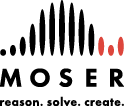Cultivating Curiosity
By Moser Educational Services | June 13, 2019

Albert Einstein noted, “The important thing is not to stop questioning. Curiosity has its own reason for existing.” And, it appears, perhaps unsurprisingly, that Einstein was right. Research by Susan Engel in her book The Hungry Mind suggests that in school, curiosity is severely underappreciated.
Defined as “the recognition, pursuit, and intense desire to explore novel, challenging, and uncertain events” by researchers Todd Kashdan and Paul Silvia, curiosity has been shown to be a powerful determinant of academic achievement. But, in our country’s standardized testing mania, it appears our schools are missing out on what really matters about learning: Instilling the desire to learn in our students in the first place. As Susan Engel notes, teachers rarely encourage curiosity in the classroom. And, curiosity is almost completely absent from the field of gifted-and-talented education. A recent survey of required gifted-and-talented identification methods across U.S. states found that only three states considered the desire to learn a part of giftedness.
But, the results of the 45-year Study of Mathematically Precocious Youth of children who at age 12 scored in the top 1 percent on the SAT and were thereafter tracked and supported provides some interesting results. Yes, the primary finding was that early advanced test scores are an indication of a student’s readiness for more enhanced resources, but what other conclusions can be drawn from these findings?
The researchers in this study also measured what they call “academic intrinsic motivation” and identified the top 19 percent of the 111 participants as “motivationally gifted.” This cohort displayed extreme enjoyment of school and of learning challenging, difficult tasks. Most interestingly, the researchers found very little correlation between intellectual giftedness and motivational giftedness. While the intellectually gifted students showed greater intellectual curiosity from infancy through adulthood, only 8 children were both intellectually gifted and motivationally gifted. Most strikingly, the vast majority of the differences on the academic intrinsic motivation test could not be explained by differences in IQ scores, and academic intrinsic motivation predicted high-school GPA independently of IQ. The conclusion: Intellectual curiosity is a distinctly different gift.
Students with gifted intellectual curiosity outperform their peers on a wide range of educational outcomes, such as SAT scores, math and reading outcomes, and college attainment. These findings have important implications for education, suggesting that motivation should be nurtured in its own right. For example, classroom activities that offer surprise and complexity while allowing for greater student autonomy and choice are better for encouraging students to ask questions, question assumptions, and achieve mastery than rote testing.
So, as educators what can we do? First, we need to make our students comfortable with struggle. Second, we need our students to know it’s good to not be right the first time. We do not need success right away. Finally, we need to encourage our students to ask the questions, instead of the questions being presented to them.
Our education system is overly structured. But, the most important problems we face and will face in the future are complex, changing, and uncertain. Here at Moser Educational Services, we believe that when you look at the issues facing society now—whether it be climate change, health care, or terrorism—it is our kids who have the most potential to solve these problems. So, it’s imperative we do our part to teach them how to be intellectually curious, cognitively flexible problem solvers. We pride ourselves on being an educational resource to our community. If you’d like to discuss this topic further, please contact our team via email at info@mosereducational.com or just call (720) 605-6622.
